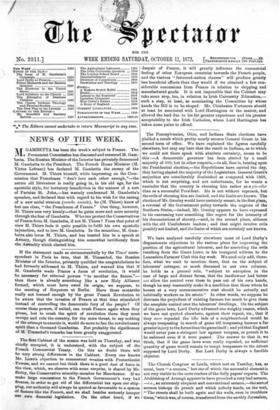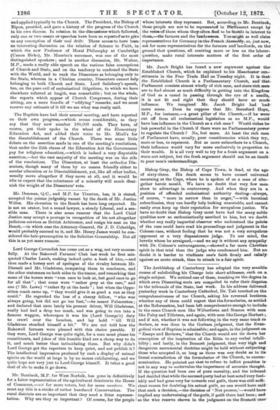The Church Congress at Leeds, which met on Tuesday, has,
as usual, been "a success," but one of which the successful element is not very visible to the mere readers of the daily papers' reports. The Archbishop of Armagh appears to have preached a very bad sermon, —i.e., an extremely eloquent and conventional sermon,—the sort of sermon bishops do preach and which nobody heeds, on the text, "The streets shall be built again and the walls, even in troublous times," which was, of course, transferred from the earthly Jerusalem,
and applied typically to the Church. The President, the Bishop of Ripon, presided, and gave a history of the progress of the Church in his own diocese. In relation.th the discussionewhich followed, only one or two essays or-speeches have been so reported-las-to gives us any conception of their real drift: There seems-to have been an interesting discussion on the relation of Science to Faith, in which the new Professor of Moral Philosophy at Cambridge (Canon Birks), Mr. Maurice's successor, was one of the most distinguished speakers ; and in another discussion, Mr. Walter, M.P., made a really able speech on the various false conceptions of Church and State, and on the tendency to confound the State with the World, and to rank the Dissenters as belonging only to the State, whereas in a Chistian country, Dissenters cannot help belonging to both Church and State. Lord Salisbury's speech, too, on the pure evil of ecclesiastical litigations, to which we have elsewhere referred at length, was remarkable ; but on the whole, the reports which appear of Church Congresses, during their sitting, are a mere bundle of "edifying" remarks, and we must reserve any estimate of it till we see what was really said.



































